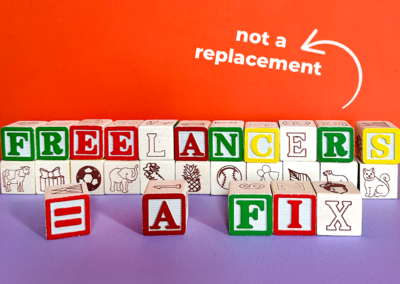In marketing circles these days, “fractional CMO” is a big buzzword. Hiring a highly experienced marketing executive for some part-time strategizing is increasingly common, especially among startups or companies dealing with shrinking budgets or stagnating growth.
Would hiring someone in this role be a good option for your company? We put this question to two executives who actually do this kind of work. Dana Doron is a fractional CMO for consumer products in the San Francisco Bay area, while Kate Walling is a Seattle-based fractional CMO and marketing consultant for tech companies. Both have over two decades of experience in the industry.
In what situations would their services be worth your while? Here’s what they said.
1. Growth has slowed or plateaued
“One of the telltale signs that a company needs a fractional CMO is that they’ve had steady growth for a while, and then it levels off and nothing seems to move the needle anymore,” says Dana. “They need someone to come in and examine all the touchpoints.”
Dana adds that if a company is struggling to grow further, she begins by doing an audit of absolutely everything. “I’ll look at all of the analytical data, whether it be from Shopify or Facebook Analytics, email open rates, click-throughs, website conversions, you name it.”
An executive like Dana has experience in all of these areas and can spot where the breakdown might be. She says that someone with a fresh perspective can find big issues that may be blind spots for someone too close to the brand or identify seemingly small opportunities that will collectively make a big difference.
Companies aren’t necessarily flailing when they contact Kate, but, she says, sometimes they just need to sharpen things. “They may say, ‘Our team is doing well, but we feel like we could be doing more. We want to grow more exponentially.’” So she comes in and meets them where they are, helping them to maximize growth without having to hire more full-time people or spend a lot more money.
2. Your marketing team is suffering from low morale or high turnover (or both)
In Kate’s experience, she’s sometimes called in to help a company solve a marketing challenge, but then discovers that part of the problem is how the marketing team is perceived.
“Someone from the leadership team might say, ‘We hired this marketing executive, and I think they’re quiet-quitting on us,’” Kate explains. “But quiet quitting can also be a marketer who’s been edited to death.”
In some cases, the marketing team might not be thriving because of a difficult work atmosphere or a misalignment with leadership. “Anything they try to do or anything they produce, the leadership team edits it to the point that it’s no longer what they wanted to accomplish,” she says. “So the marketer doesn’t want to talk anymore.”
Identifying (and fixing!) the causes of low morale can prevent it from becoming a turnover issue for your marketing team. A fractional CMO can help establish standards of work, push projects along, and create a buffer between leadership and the marketing team that’s sometimes necessary.
3. You’re short staffed
In marketing, there’s always more work that can be done, from launching your brand on new social media channels to email campaigns, out-of-home advertising, event sponsorships—the list goes on.
But what if layoffs have decimated the marketing department? Or a small start-up doesn’t have the budget to build a full team? A fractional CMO can be hired to manage marketing in these “short-staffed” situations.
“[The company doesn’t] have the resources to hire different people for all the different roles,” Dana says. “So you have to be canny about everything . . . and figure out what to prioritize. There’s limited money and limited people, so you have to make a judgment about what to do and what not to do.”
A fractional CMO becomes your investment advisor, making sure you’re spending your money and time in the right places, which pays dividends by also protecting your team from burnout.
And when the time comes to start hiring again, you need that skill set as well. The best fractional CMOs “know what to look for [in a new hire], how to mentor someone in and out of a role, and how to get a team excited about where they are going,” Kate adds. “Resourcing also means how to find good creative agencies and how to use freelancers from those agencies.”
4. You aren’t sure how to tell the story of your company or product
This is a common issue in the tech industry, where a company might have a very valuable product with tech-savvy experts behind it, but no one’s telling a story.
“I had one company come to me, and they didn’t really have a brand,” Kate says. “They had a valuable product, product-market fit, and a logo, but they hadn’t built out assets or a meaningful creative direction to support it.”
This is when a company needs someone with a brand strategy background to step in.
“Frequently these companies are doing all the tactical stuff right and are technically competent, but they’re missing the overall strategy that needs to flow through everything they do,” Dana says.
She adds that a company might not be highlighting the USP (unique selling proposition) clearly enough or getting the messaging just right so their product is differentiated from others like it.
“Sometimes I’ll tell them that they need to stop the email program or online ads until we really hone the brand strategy of what will set you apart,” she says. “You need to get this foundational stuff right because otherwise you will just be spinning your wheels.”
This necessitates an executive who can take a holistic view of an entire company—and can lead to insights that go beyond branding. When Dana was looking at the analytics for one of her clients, she noticed that the problem was less of a marketing issue and more of a product development one. “It was their product mix,” she says. “One product out of a line of 14 SKUs was generating 75% of their sales. They needed to find more winners and work on product development.”
5. You’re in need of a tech upgrade
“In a lot of industries, the company could be selling more,” Kate says. “But someone is starting to realize there could be a digital transformation [needed] to hit some larger growth goals.”
This could mean exploring more digital channels, or merely investing in better software. A good fractional CMO knows the differences among the various marketing automation tools (like HubSpot, Salesforce, or Marketo), and which ones are best for which companies. These are big decisions, because of the cost involved.
“If you put one in place, you can change it, but they are expensive to change,” Kate says. “Your digital strategy becomes a plan that maps toward resourcing and budget.”
When a company is short-staffed, a fractional CMO might look into AI options. “That’s where you have to be discerning,” Kate explains. “Is there a way to tool up? Sometimes there are tools that can do things faster, and AI is popping up everywhere.”
For example, you can now buy AI-powered PR platforms, social engagement tools, and sales software that helps marketing and sales teams manage their interactions with clients.
“If I can access the right PR tool, maybe I could hire a part-time PR person [to use that tool] rather than spending money on an agency retainer,” Kate explains.
In today’s uncertain economy, those cost-cutting ideas might be the greatest reason of all to hire a fractional CMO.
Ready to find out more about how a fractional CMO can help you solve your company’s unique challenges? Answer a few questions to get started.



